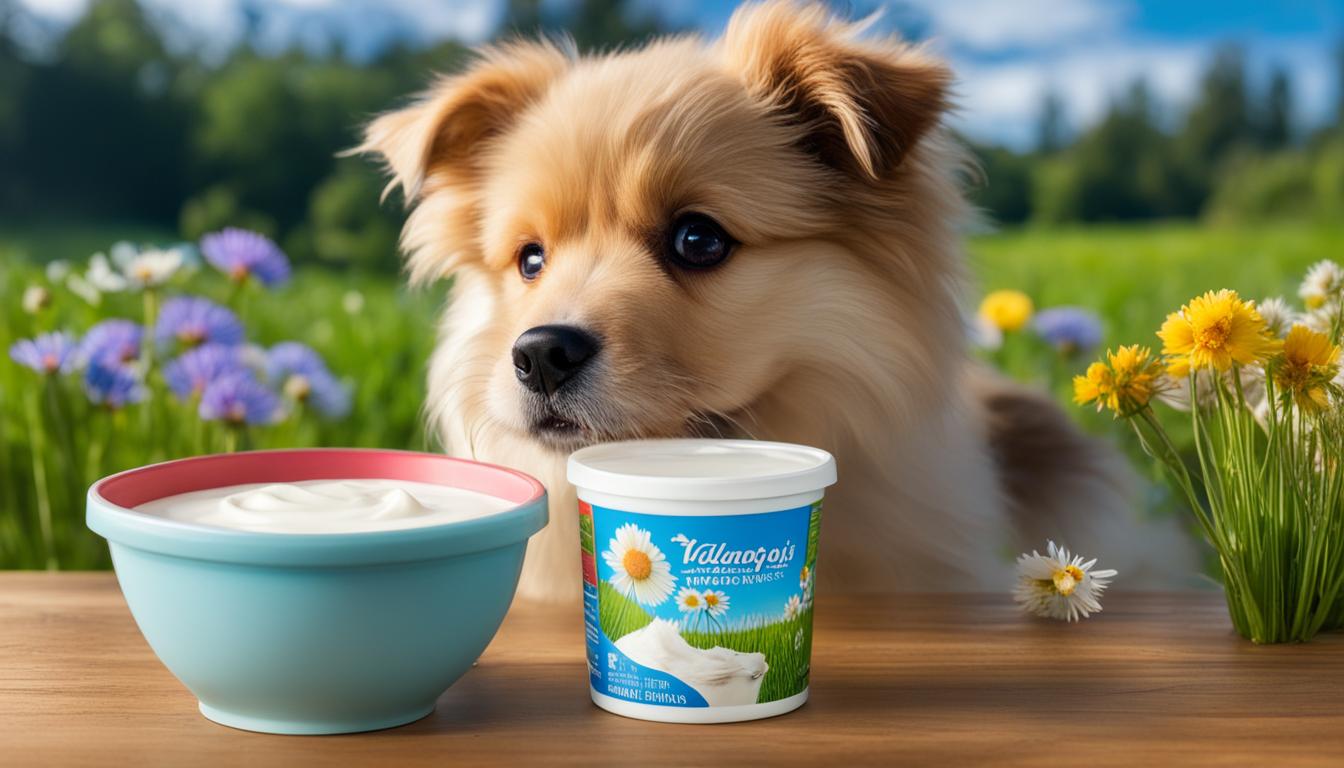Are you wondering if it’s safe for your furry friend to indulge in a creamy bowl of yogurt? While dogs can enjoy certain dairy products, such as cheese, yogurt is a bit trickier due to its lactose content. Let’s explore the pros and cons of feeding yogurt to your canine companion, and find out if it’s a good choice for their digestive health.
Key Takeaways:
- Yogurt contains lactose, which some dogs may have difficulty digesting, leading to gas, diarrhea, and vomiting.
- Plain and unsweetened yogurt with live cultures, such as Greek-style yogurt, has lower levels of lactose and can be a better option for dogs.
- Yogurt can act as a probiotic and provide beneficial nutrients like calcium and protein, but there are better sources of probiotics specifically formulated for dogs.
- Purina Pro Plan Veterinary Diets FortiFlora is a recommended probiotic supplement for dogs without lactose that can be difficult to digest.
- Consult a veterinarian for guidance on the appropriate diet and treats for your dog’s specific needs.
Is Yogurt Good for Dogs?
Yogurt can be a beneficial addition to a dog’s diet, offering various health benefits. It contains calcium and protein, which are essential for maintaining strong bones and muscles. Additionally, yogurt can provide probiotics that support a healthy digestive system in dogs.
When choosing yogurt for your furry friend, opt for plain and unsweetened varieties with live cultures. Greek yogurt, in particular, is a good option as it has a lower lactose content compared to other types of yogurt. This makes it easier for dogs to digest and reduces the risk of digestive issues such as gas and diarrhea.
For puppies, yogurt can be a valuable source of nutrients. It can be incorporated into homemade dog food recipes to enhance their nutritional content. However, it’s important to introduce yogurt gradually and monitor your puppy’s reaction to ensure they can tolerate it well.

Yogurt also has potential benefits for a dog’s skin health. The probiotics found in yogurt can help improve the balance of beneficial bacteria in the gut, which in turn can positively impact the skin. This can be particularly beneficial for dogs with skin allergies or irritations.
While yogurt can offer these benefits, it’s crucial to maintain moderation and take certain precautions. Too much yogurt, especially if it’s high in fat, can lead to stomach upset and even pancreatitis in dogs. Additionally, avoid yogurt with added sugars or artificial additives, as these can be harmful to your canine companion.
Table: Comparison of Yogurt Types
| Yogurt Type | Lactose Content | Recommended for Dogs |
|---|---|---|
| Plain Greek Yogurt | Low | Yes |
| Flavored Yogurt | High | No |
| Yogurt with Added Sugars | High | No |
In summary, yogurt can be good for dogs when given in moderation and the right type is chosen. Plain, unsweetened yogurt with live cultures, such as Greek yogurt, can provide valuable nutrients and probiotics while minimizing lactose content. Remember to consult with your veterinarian before making any significant dietary changes for your dog.
Hazards of Feeding Dogs Yogurt
If you’re considering feeding your dog yogurt, it’s essential to be aware of potential hazards. While yogurt can provide some benefits to dogs, there are factors you should consider to keep your furry friend safe and healthy.
One hazard is the lactose content in yogurt. Dogs, like some humans, may have difficulty digesting lactose, a sugar found in milk and dairy products. Consuming yogurt with high lactose levels can result in digestive issues such as gas, diarrhea, and vomiting. To minimize these risks, opt for plain and unsweetened yogurt varieties with lower lactose levels, such as Greek-style yogurt. It’s important to consult with your veterinarian to determine if yogurt is suitable for your dog’s specific dietary needs.
Another hazard is the fat content in yogurt. Feeding dogs yogurt that is high in fat can lead to stomach upset and potentially more severe conditions like pancreatitis. Therefore, it’s crucial to offer yogurt to your dog in moderation and avoid excessive fat intake. Additionally, be cautious of yogurt flavors that contain added sugars, both natural and artificial, as they are not healthy for dogs.
When giving your dog yogurt treats, remember to monitor their reaction and provide them in small amounts. While dogs may enjoy the taste of yogurt, it’s best to limit their intake to prevent any adverse effects. Furthermore, be aware that certain yogurt flavors may contain additives that can be unsafe for dogs, so always read the ingredients carefully.
To summarize, while yogurt can have some benefits for dogs, it is important to be cautious of potential hazards. Consider the lactose content, fat levels, and presence of added sugars in yogurt when deciding whether to incorporate it into your dog’s diet. Opt for plain and unsweetened varieties with lower lactose levels, feed yogurt in moderation, and avoid flavors with unsafe additives. Prioritize your dog’s health and consult with a veterinarian for personalized guidance on what is best for their specific dietary needs.
Can Yogurt Benefit Dogs?
When it comes to the benefits of yogurt for dogs, one key aspect to consider is its probiotic content. Probiotics are live bacteria and yeasts that are beneficial for a dog’s digestive health. They help maintain a healthy balance of bacteria in the gut, protect against harmful pathogens, improve nutrient absorption, and support the immune system. While yogurt does contain probiotics, there are better sources available specifically designed for dogs.
One such option is Purina Pro Plan Veterinary Diets FortiFlora, a probiotic supplement formulated for dogs. Unlike yogurt, FortiFlora does not contain lactose, which can be difficult for dogs to digest. It provides a concentrated and controlled amount of probiotics, ensuring your dog receives the right balance of beneficial bacteria without any potential digestive issues.
While yogurt can be a part of your dog’s diet in moderation, it is not the most effective way to provide probiotics. FortiFlora offers a more targeted approach, ensuring your dog gets the digestive benefits without the potential drawbacks of yogurt. It is always important to consult with a veterinarian to determine the best probiotic options for your dog’s specific needs.
| Yogurt | Purina Pro Plan Veterinary Diets FortiFlora |
|---|---|
| Contains lactose, which some dogs may have trouble digesting | Lactose-free, eliminating the risk of digestive issues |
| May contain added sugars and additives | Controlled formulation with no unnecessary ingredients |
| Can vary in probiotic content and efficacy | Concentrated and targeted delivery of beneficial bacteria |
| Can cause stomach upset and pancreatitis if fed in excess | Designed for controlled and safe supplementation |
While yogurt has its benefits, there are better options available to ensure your dog receives the full advantages of probiotics. Consider incorporating a targeted probiotic supplement like Purina Pro Plan Veterinary Diets FortiFlora into your dog’s diet under the guidance of a veterinarian. Your dog’s digestive health will thank you.
Conclusion
Can Dogs Eat Yogurt? While yogurt can be consumed by dogs, it is important to consider their digestive issues and lactose sensitivity. Dogs, like humans, can experience difficulty digesting lactose, which is present in yogurt. This can lead to unpleasant symptoms such as gas, diarrhea, and vomiting. Therefore, it is crucial to be mindful of their response when introducing yogurt into their diet.
If you decide to offer yogurt to your furry friend, it is best to choose plain and unsweetened varieties that are free from additives. Dairy-free yogurt options can also be considered if your dog has a lactose intolerance. Remember, moderation is key when offering yogurt treats to your dog.
When it comes to improving your dog’s digestive health, there are alternative options that may be more beneficial. Probiotic supplements specifically formulated for dogs, such as Purina Pro Plan Veterinary Diets FortiFlora, are a recommended choice. These supplements are designed to support your dog’s digestive system without the potential issues associated with yogurt.
As always, it is essential to consult with your veterinarian for guidance on the best diet and treats for your dog’s individual needs. They can provide you with expert advice tailored to your dog’s specific digestive issues, ensuring their health and well-being. Remember, a happy and healthy pup is worth the extra effort!
FAQ
Can dogs eat yogurt?
Yes, dogs can eat yogurt. However, many dogs have trouble digesting it due to the lactose content.
Is yogurt good for dogs?
Yogurt can be beneficial for dogs as it is high in calcium and protein. It can also act as a probiotic, promoting a healthy digestive system.
Can dogs eat any kind of yogurt?
Plain and unsweetened yogurt with live cultures, such as Greek-style yogurt, is better for dogs as it has lower levels of lactose.
What happens if dogs eat yogurt with lactose?
Dogs may have trouble digesting lactose and can experience gas, diarrhea, and vomiting if they consume yogurt with lactose.
Can yogurt cause stomach upset in dogs?
Feeding dogs too much fat from yogurt can cause stomach upset and even pancreatitis.
What is a recommended probiotic supplement for dogs?
Purina Pro Plan Veterinary Diets FortiFlora is a recommended probiotic supplement for dogs without the lactose that can be difficult to digest.
Can yogurt be used in homemade dog food recipes?
Yes, yogurt can be used as a source of nutrients in homemade dog food recipes.
Can yogurt improve the skin health of dogs?
Yes, yogurt can help improve the skin health of dogs.
Can dogs eat yogurt treats?
Yes, dogs can eat yogurt treats, but they should be given in moderation and in small amounts to monitor any adverse reactions.
Are all yogurt flavors safe for dogs?
Some yogurt flavors may contain additives that are unsafe for dogs, so it is important to read the ingredients carefully.
Are there better sources of probiotics for dogs than yogurt?
While yogurt can provide probiotics for dogs, there are better options available, such as Purina Pro Plan Veterinary Diets FortiFlora.
Should dogs with lactose intolerance eat yogurt?
Dogs with lactose intolerance may have adverse reactions to yogurt and should avoid consuming it.
Who should I consult for guidance on my dog’s diet?
It is best to consult a veterinarian for any concerns or questions regarding what to feed your dog.





